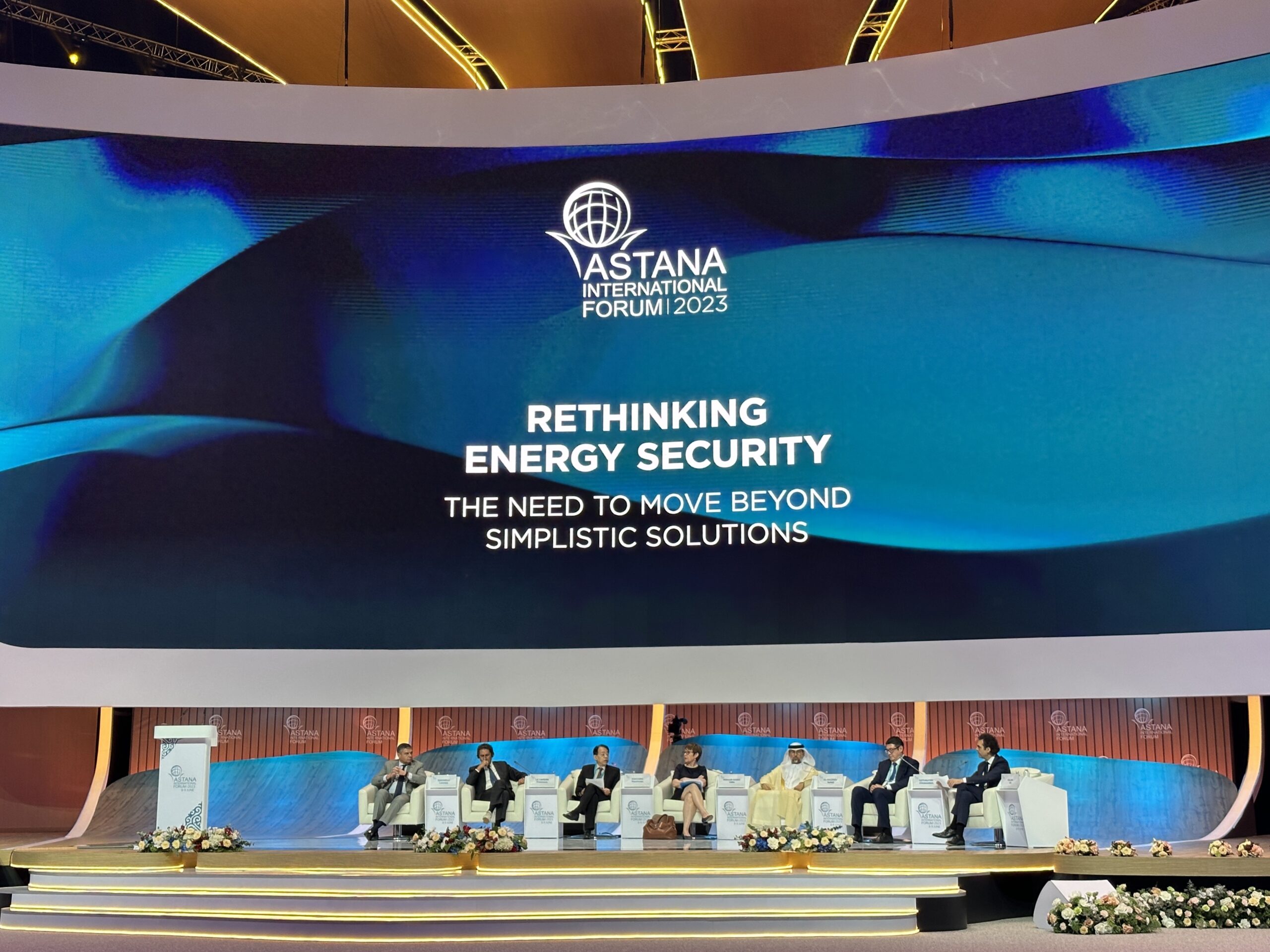ASTANA – All countries must work together to achieve a smooth transition towards a green economy that comes in tandem with energy security and economic feasibility, according to experts who spoke at the energy security panel session on day two of the Astana International Forum (AIF) on June 9.

Global executives joined at “Rethinking energy security: the need to move beyond simplistic solutions” panel at the AIF. Photo credit: Aibarshyn Akhmetkali/The Astana Times.
The transition must not only meet the environmental goal of net-zero emissions but represent an economically viable and forward-looking solution, bringing all countries and regions along, the experts argued.
Kazakh Minister of Energy Almassadam Satkaliyev was one of the speakers alongside Suhail Mohamed Al Mazrouei, Minister of Energy of the United Arab Emirates.
“For us, the question of rethinking energy security is not only about the construction of new power plants or additional investment into exploration, but also the question of diversification,” said Satkaliyev.
According to Al Mazrouei, global challenges to energy security require swift action from all countries.
“Energy security is a global issue and it’s affecting all of us. We can’t deal with it country by country or even regionally. We have to deal with it as a planet,” he said.
“Together with our [partners] here in Kazakhstan and in the region, we are trying to enhance international connectivity by electrical integration of the grid connection. Energy security is aiming to deliver electricity to our people and our economies. So we are interconnected,” he added.
The world should contribute feasible solutions that balance a green transition with economic growth, according to Al Mazrouei.
“We need to identify practical steps that are enabling economic growth as well. Otherwise, we’re not being practical if we just say we’re going to shut the economy just to achieve an environmental goal,” said Al Mazrouei.
Energy conservation is also a step that should not be overlooked.
“We are using too much,” said Al Mazrouei. “The conservation of energy and demand side management [is important] if we are serious about the environment. We need to reduce our consumption as countries, as individuals, and as nations.”
Countries should also make a big push towards energy-related research and development (R&D), according to Al Mazrouei.
“R&D cannot be in one country. We need to collaborate when it comes to R&D and learn about new technologies, like the use of hydrogen, small modular reactors in nuclear energy, batteries, technologies, and so on,” he said.
Addressing climate change, biodiversity and environmental issues is an “existential priority,” according to Odile Renaud-Basso, president of the European Bank for Reconstruction and Development (EBRD).
The question remains how the world can ensure a smooth transition, phasing up zero-carbon alternatives while ensuring energy security, accessibility and affordability.
According to Renaud-Basso, sustainable economic growth, the transition to a net zero world and energy security “must go hand in hand,” and focus on electricity is one of the key enablers of the green transition.
“The IAE (International Energy Agency) report on how to move towards net zero by 2050 assesses that the share of renewables will move from 33% to 80% in the energy mix with a very strong reliance on wind and solar. This shift towards the energy mix moving to electricity represents huge investment opportunities in renewables, in electric vehicles, and in all kinds of activities that will require electricity,” said Renaud-Basso.
The market is a reliable indicator of how much human actions are costing the environment and the climate, she noted.
“Bringing back price signals, ending fossil fuel subsidies in order to have market incentive working is absolutely key and this is the best way to ensure that the green transition is cost-effective because then the market will allocate,” she said.
Innovation, government involvement, proper regulations and appropriate finance were also named by Renaud-Basso as factors contributing to facilitating the smooth green transition.
The decline of fossil fuels is inevitable, according to Francesco La Camera, the Director-General of the International Renewable Energy Agency (IRENA). “We have to admit that if we want to decrease CO2 emission, the only solution is renewables,” he said.
But the transition towards a green economy also means finding solutions to key issues, such as infrastructure, institutional capacity, skilled workforce and legal environment, according to La Camera.
He advocates for more international cooperation and the inclusion of multilateral institutions in the green transition.
“It is important to refocus the way the international community works. The only entities that may build the infrastructure that we need are multilateral financial institutions. There are expenses that cannot be domestically afforded,” he said.

